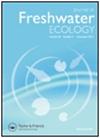Effect of sewerage development on water quality and invertebrate assemblages in a Japanese river over the long term
IF 1.3
4区 环境科学与生态学
Q3 ECOLOGY
引用次数: 1
Abstract
Abstract River water degradation arising from wastewater effluents is a major factor contributing to the deterioration of river ecosystems; yet direct evidence of the beneficial influence of long-term sewerage development on such ecosystems is scarce at a basin scale. The present study, over 12 years, examined changes in sewerage connection rate, water quality, and invertebrate assemblages at 10 study sites in the Shigenobu River, southwestern Japan, and investigated the relationships between them. Sewerage connection rates increased in the three main municipalities in the basin during the study period (range: 8.6%–31.4%). At the lowland sites, the concentration of total inorganic nitrogen (TIN) decreased by 38.9% on average and the richness metrics of invertebrate assemblages significantly increased at several sites. Furthermore, the richness metrics negatively related with TIN concentration, implying that invertebrate diversity recovery was the result of water quality improvement. Our findings strongly suggest that sewerage system improvement is an effective measure for restoring river ecosystems.污水处理系统开发对日本河流水质和无脊椎动物组合的长期影响
摘要废水引起的河水退化是导致河流生态系统恶化的主要因素;然而,在流域范围内,很少有直接证据表明长期污水处理发展对此类生态系统的有益影响。本研究,超过12 年,研究了日本西南部志贺野部河10个研究点的污水连接率、水质和无脊椎动物组合的变化,并调查了它们之间的关系。在研究期间,流域内三个主要城市的下水道连接率都有所提高(范围:8.6%-31.4%)。在低地,总无机氮(TIN)浓度平均下降了38.9%,几个地点的无脊椎动物群落丰富度指标显著增加。此外,丰富度指标与TIN浓度呈负相关,表明无脊椎动物多样性的恢复是水质改善的结果。我们的研究结果有力地表明,改善下水道系统是恢复河流生态系统的有效措施。
本文章由计算机程序翻译,如有差异,请以英文原文为准。
求助全文
约1分钟内获得全文
求助全文
来源期刊
CiteScore
2.20
自引率
7.70%
发文量
34
审稿时长
3 months
期刊介绍:
The Journal of Freshwater Ecology, published since 1981, is an open access peer-reviewed journal for the field of aquatic ecology of freshwater systems that is aimed at an international audience of researchers and professionals. Its coverage reflects the wide diversity of ecological subdisciplines and topics, including but not limited to physiological, population, community, and ecosystem ecology as well as biogeochemistry and ecohydrology of all types of freshwater systems including lentic, lotic, hyporheic and wetland systems. Studies that improve our understanding of anthropogenic impacts and changes to freshwater systems are also appropriate.

 求助内容:
求助内容: 应助结果提醒方式:
应助结果提醒方式:


